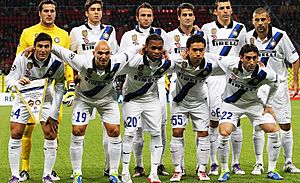Diego Milito facts for kids
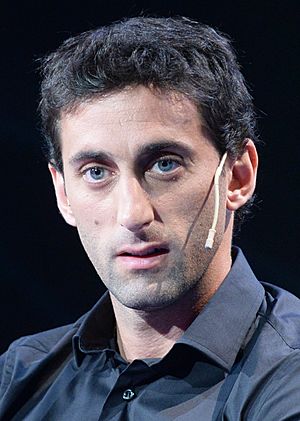
Milito in 2015
|
|||
| Personal information | |||
|---|---|---|---|
| Full name | Diego Alberto Milito | ||
| Date of birth | 12 June 1979 | ||
| Place of birth | Bernal, Argentina | ||
| Height | 1.83 m (6 ft 0 in) | ||
| Position(s) | Striker | ||
| Youth career | |||
| Racing Club | |||
| Senior career* | |||
| Years | Team | Apps | (Gls) |
| 1999–2003 | Racing Club | 137 | (34) |
| 2003–2005 | Genoa | 59 | (33) |
| 2005–2008 | Zaragoza | 108 | (53) |
| 2008–2009 | Genoa | 31 | (24) |
| 2009–2014 | Inter Milan | 128 | (62) |
| 2014–2016 | Racing Club | 52 | (18) |
| Total | 516 | (224) | |
| International career | |||
| 2003–2011 | Argentina | 25 | (4) |
| *Club domestic league appearances and goals | |||
Diego Alberto Milito, born on June 12, 1979, is a famous former football player from Argentina. He played as a striker, which means he was usually the main goal scorer for his team. People called him El Principe, which means "The Prince" in Spanish. This nickname came from his resemblance to another famous football player, Enzo Francescoli.
Milito started his football journey in Argentina with Racing Club in 1999. Later, he moved to Italy to play for Genoa in 2003. In 2005, he joined the Spanish club Real Zaragoza for three seasons. He then returned to Genoa in 2008, where he scored many goals.
His amazing goal-scoring skills at Genoa led him to join Inter Milan, a top team in Italy. He was a key player in Inter's incredible 2009–10 season, when they won three major trophies! He scored 30 goals that season, including two important goals in the 2010 UEFA Champions League Final. Milito went back to Racing Club in 2014 and retired from playing football in 2016.
For his country, Argentina, Milito played 25 times and scored 4 goals. He represented Argentina in two Copa América tournaments and the 2010 FIFA World Cup.
Contents
Club Career Highlights
Starting at Racing Club
Milito began his professional career in 1999 with Racing Club in Argentina's top league. He helped them win the 2001 Apertura tournament. During this time, his younger brother, Gabriel, played for Racing's biggest rival, Independiente. They often played against each other in the exciting Avellaneda derby matches.
Moving to Genoa
In early 2004, Milito moved to Italy to play for Genoa, which was in the second division at the time. He had two very successful seasons there, scoring 33 goals in 59 games. However, Genoa was moved down to a lower league because of a problem with a match. This meant Milito had to leave the club. He then joined his brother Gabriel at Real Zaragoza in Spain.
Time at Real Zaragoza
Milito quickly made an impact at Real Zaragoza. In 2006, he scored four goals in a Copa del Rey semi-final match, helping his team beat Real Madrid 6–1! He ended that season as Zaragoza's top scorer with 16 goals.
In the 2006–07 season, Milito was one of the best scorers in the Spanish league, with 23 goals. Zaragoza decided to buy him permanently after his loan period. He even became the team captain after his brother Gabriel moved to Barcelona. Milito scored a total of 61 goals in his three seasons with Zaragoza.
Back to Genoa
On September 1, 2008, Milito made a surprising return to Genoa. Even though other big European clubs wanted him, he chose to go back to Genoa because he loved the club. He played his first game back in Italy's top league, Serie A, on September 14 against Milan. Genoa won 2–0, with Milito assisting one goal and scoring the other. He scored his first hat-trick (three goals in one game) for Genoa on November 9 in a 4–0 win against Reggina. He finished the season with 24 goals, making him one of the top scorers in the league.
Joining Inter Milan
The Treble-Winning Season (2009–10)
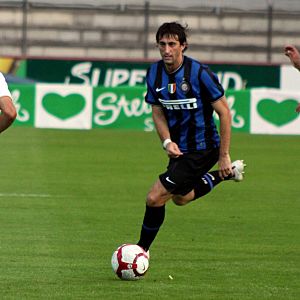
On May 20, 2009, Diego Milito joined Inter Milan, a very famous Italian club. He quickly settled in and had a fantastic start, scoring two goals against city rivals Milan in a friendly match. In his first league game against Milan, he helped Inter win 4–0 by assisting two goals and scoring a penalty.
Milito continued to score consistently throughout his first season at Inter. He became a crucial player for the team. On November 4, he scored his first goal in the UEFA Champions League against Dynamo Kyiv, helping Inter win 2–1. He scored another important Champions League goal against Chelsea in February.
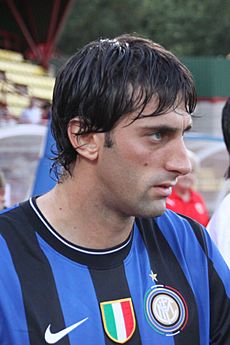
Milito was incredibly important in Inter's historic treble win in the 2009–10 season. This meant they won three major trophies: the Italian Cup, the Italian League (Serie A), and the Champions League.
- On May 5, 2010, he scored the only goal in the Italian Cup final against Roma, winning the first trophy.
- Eleven days later, his goal against Siena secured Inter's 18th Scudetto (Serie A title). Milito said this was the "best goal of his career" because it won the league.
- On May 22, 2010, Milito was the hero in the Champions League Final against Bayern Munich. He scored both goals in a 2–0 victory, making Inter European champions for the first time in 45 years and completing their amazing treble!
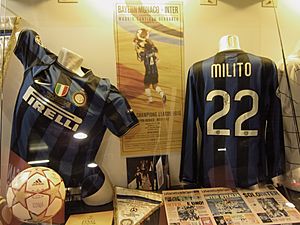
Milito finished this incredible season with 30 goals across all competitions.
Following the Treble (2010–11)
After the treble, Milito signed a new four-year contract with Inter. In August 2010, he was named the best player and best striker in European club football for the previous season. He helped Inter win the Supercoppa Italiana against Roma. However, he had a season with more injuries and scored 8 goals in 34 games as Inter finished second in the league.
Strong Comeback (2011–12)
In the first Serie A match of the 2011–12 season, Milito scored two goals. On November 2, he scored his 200th club goal in a Champions League match against Lille.
On February 1, Milito scored all four of Inter's goals in an exciting 4–4 draw against Palermo. This was his second time scoring four goals in a single game. He also scored a hat-trick against his old club Genoa on April 1. On May 6, he scored another hat-trick in the Derby della Madonnina against Milan, helping Inter win 4–2. He finished the season with an impressive 24 goals.
Injury Challenges (2012–13)
Milito started the 2012–13 season well, scoring in Inter's first game. On October 31, he scored his 200th career goal across all competitions. On November 4, he scored twice against Juventus in Turin, ending Juventus's 49-match unbeaten run at their stadium.
However, Milito faced more injury problems. In February 2013, he suffered a serious knee injury during a UEFA Europa League match. This injury meant he would be out of action for at least six months, ending his season early.
Final Inter Season (2013–14)
Milito returned to play for Inter in September 2013, scoring two goals in a big 7–0 win against Sassuolo. But injuries continued to bother him, causing him to miss more games. In total, Milito scored 75 goals in 171 games for Inter during his five seasons with the club.
Return to Racing Club
In 2014, Milito made an emotional return to his first club, Racing Club. He scored in his first game back, helping Racing win 3–1. He continued to score important goals, including a penalty against Arsenal de Sarandí.
Milito played a key role in Racing winning the 2014 Transición championship. This was Racing's first title in 13 years, and Milito had also been part of the team that won in 2001. He said that winning the league with Racing was a dream come true.
On May 21, 2016, at the age of 36, Milito scored a penalty in his very last professional match, a 2–0 win against Temperley. He ended his club career with 254 goals in 607 appearances.
International Career
Milito first played for the Argentina national team on January 31, 2003, against Honduras, where he also scored his first goal. He scored two more goals against Uruguay in July 2003.
He played for Argentina in the 2007 Copa América tournament, scoring a goal against Colombia. Argentina reached the final but lost to Brazil.
Because of his great performances at Genoa and Inter, Milito was called up more often for Argentina, especially under manager Diego Maradona. Maradona included Milito in the Argentina squad for the 2010 FIFA World Cup in South Africa. Milito played in two games as Argentina was knocked out by Germany in the quarter-finals.
Retirement and Legacy
After retiring from playing football, Diego Milito's last club, Racing Club, held a special tribute match for him on November 12, 2016. Many of his former teammates, friends, and family members took part. Milito, at 37, scored two goals in the match and received a huge cheer from the Racing fans. He is seen as one of the club's most important players.
Playing Style
Diego Milito was known as a quick, smart, and skilled forward. He had great vision and was calm when scoring goals. He was good at moving around the field and excellent at heading the ball. He could score with both feet, even though he was naturally right-footed. He was also very accurate when taking penalty kicks.
Experts described Milito as a "pure Number 9" striker, meaning he was a natural goal scorer, especially inside the penalty area. Even though he wasn't as flashy as some other players, his efficient and consistent goal-scoring made him one of the best. After his amazing treble season with Inter, many people finally recognized his talent and how important he was to his teams.
Sports Manager Role
After his playing career, Diego Milito became the sports manager for Racing Club. In this role, he helped bring in great players and built a strong sports plan. Under his management, Racing won two more titles: the Superliga 2018/19 and the Trofeo de Campeones 2019.
Milito left his position at the end of 2020 due to disagreements with the club's leaders.
Personal Life
Diego Milito has strong Italian family roots, as his father's family came from a town in Italy called Terranova da Sibari. He also has Spanish roots from his mother's side. Milito is married to Sofía, and they have three children. His younger brother, Gabriel, was also a professional football player. They even played against each other in Champions League games when Gabriel was at Barcelona. On the day he retired from football, May 21, 2016, Milito celebrated the birth of his third daughter, Morena. His son, Leandro, is currently part of the Racing Club youth team.
Career Statistics
Club Appearances and Goals
| Club | Season | League | National cup | Continental | Other | Total | ||||||
|---|---|---|---|---|---|---|---|---|---|---|---|---|
| Division | Apps | Goals | Apps | Goals | Apps | Goals | Apps | Goals | Apps | Goals | ||
| Racing Club | 1999–2000 | Argentine Primera División | 11 | 1 | – | – | – | 11 | 1 | |||
| 2000–01 | Argentine Primera División | 35 | 2 | – | – | – | 35 | 2 | ||||
| 2001–02 | Argentine Primera División | 38 | 9 | – | – | – | 38 | 9 | ||||
| 2002–03 | Argentine Primera División | 35 | 14 | – | 11 | 3 | – | 46 | 17 | |||
| 2003–04 | Argentine Primera División | 18 | 8 | – | – | – | 18 | 8 | ||||
| Total | 137 | 34 | 0 | 0 | 11 | 3 | – | 148 | 37 | |||
| Genoa | 2003–04 | Serie B | 20 | 12 | 0 | 0 | — | — | 20 | 12 | ||
| 2004–05 | Serie B | 39 | 21 | 3 | 1 | — | — | 42 | 22 | |||
| Total | 59 | 33 | 3 | 1 | — | — | 62 | 34 | ||||
| Real Zaragoza | 2005–06 | La Liga | 36 | 15 | 8 | 6 | — | — | 44 | 21 | ||
| 2006–07 | La Liga | 37 | 23 | 3 | 0 | — | — | 40 | 23 | |||
| 2007–08 | La Liga | 35 | 15 | 4 | 2 | 2 | 0 | — | 41 | 17 | ||
| Total | 108 | 53 | 15 | 8 | 2 | 0 | — | 125 | 61 | |||
| Genoa | 2008–09 | Serie A | 31 | 24 | 1 | 2 | — | — | 32 | 26 | ||
| Inter Milan | 2009–10 | Serie A | 35 | 22 | 5 | 2 | 11 | 6 | 1 | 0 | 52 | 30 |
| 2010–11 | Serie A | 23 | 5 | 3 | 1 | 4 | 1 | 4 | 1 | 34 | 8 | |
| 2011–12 | Serie A | 33 | 24 | 1 | 0 | 7 | 2 | — | 41 | 26 | ||
| 2012–13 | Serie A | 20 | 9 | 0 | 0 | 6 | 0 | — | 26 | 9 | ||
| 2013–14 | Serie A | 17 | 2 | 1 | 0 | — | — | 18 | 2 | |||
| Total | 128 | 62 | 10 | 3 | 28 | 9 | 5 | 1 | 171 | 75 | ||
| Racing Club | 2014 | Argentine Primera División | 17 | 6 | 1 | 0 | — | — | 18 | 6 | ||
| 2015 | Argentine Primera División | 20 | 8 | 4 | 0 | 9 | 4 | 2 | 0 | 35 | 12 | |
| 2016 | Argentine Primera División | 13 | 4 | 0 | 0 | 6 | 0 | — | 19 | 4 | ||
| Total | 50 | 18 | 5 | 0 | 15 | 4 | 2 | 0 | 72 | 22 | ||
| Career total | 513 | 230 | 34 | 14 | 56 | 16 | 7 | 1 | 610 | 255 | ||
International Appearances and Goals
| National team | Year | Apps | Goals |
|---|---|---|---|
| Argentina | 2003 | 5 | 3 |
| 2004 | 2 | 0 | |
| 2005 | 0 | 0 | |
| 2006 | 0 | 0 | |
| 2007 | 6 | 1 | |
| 2008 | 2 | 0 | |
| 2009 | 5 | 0 | |
| 2010 | 4 | 0 | |
| 2011 | 1 | 0 | |
| Total | 25 | 4 | |
- Scores and results list Italy's goal tally first, score column indicates score after each Milito goal.
| No. | Date | Venue | Opponent | Score | Result | Competition |
|---|---|---|---|---|---|---|
| 1 | 31 January 2003 | Estadio Olímpico Metropolitano, San Pedro Sula, Honduras | 1–0 | 3–1 | Friendly | |
| 2 | 16 July 2003 | Estadio Ciudad de La Plata, La Plata, Argentina | 1–0 | 2–2 | Friendly | |
| 3 | 2–0 | |||||
| 4 | 2 July 2007 | Estadio José Pachencho Romero, Maracaibo, Venezuela | 4–2 | 4–2 | 2007 Copa América |
Honours and Awards
Milito won many trophies and received several awards during his career:
Racing Club
- Argentine Primera División: Apertura 2001, 2014 Transición
Real Zaragoza
- Copa del Rey runner-up: 2005–06
Inter Milan
- Serie A: 2009–10
- Coppa Italia: 2009–10, 2010–11
- Supercoppa Italiana: 2010
- UEFA Champions League: 2009–10
- FIFA Club World Cup: 2010
Individual Awards
- Guerin d'Oro: 2008–09 (Award for best player in Serie A based on average ratings)
- Serie A Goalscorer of the Year: 2009
- FIFA FIFPro World XI nominee: 2009, 2010 (Nominated as one of the best players in the world)
- Serie A Most Loved Player: 2009
- 2010 UEFA Champions League Final: UEFA Man of the Match (Best player in the Champions League Final)
- UEFA Club Forward of the Year: 2009–10 (Best forward in European club football)
- UEFA Club Footballer of the Year: 2009–10 (Best player in European club football)
- Serie A Footballer of the Year: 2009–10 (Best player in Italian Serie A)
- Serie A Foreign Footballer of the Year: 2009–10 (Best foreign player in Italian Serie A)
- Inter Milan Hall of Fame: 2020 (Recognized as one of Inter Milan's greatest players)
See also
 In Spanish: Diego Milito para niños
In Spanish: Diego Milito para niños
 | Misty Copeland |
 | Raven Wilkinson |
 | Debra Austin |
 | Aesha Ash |


